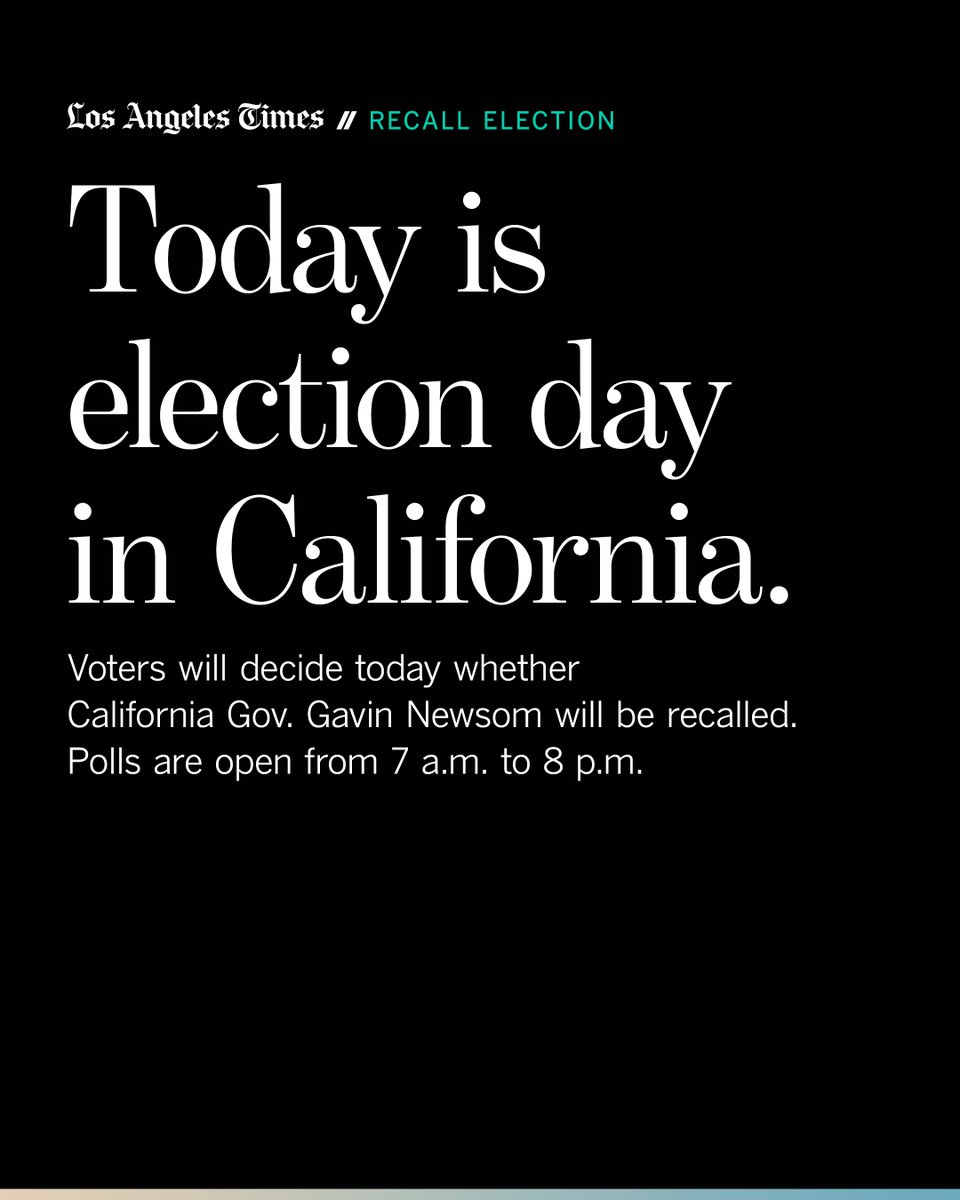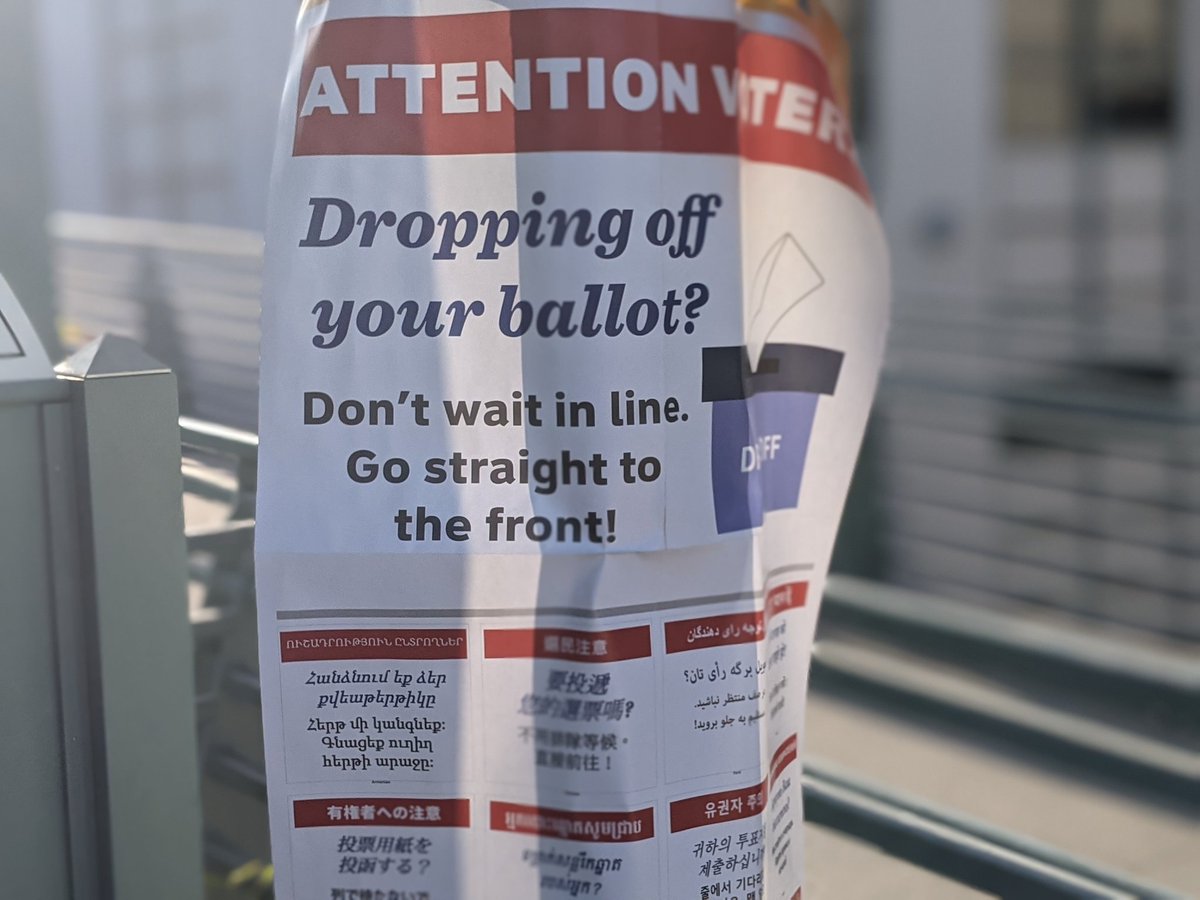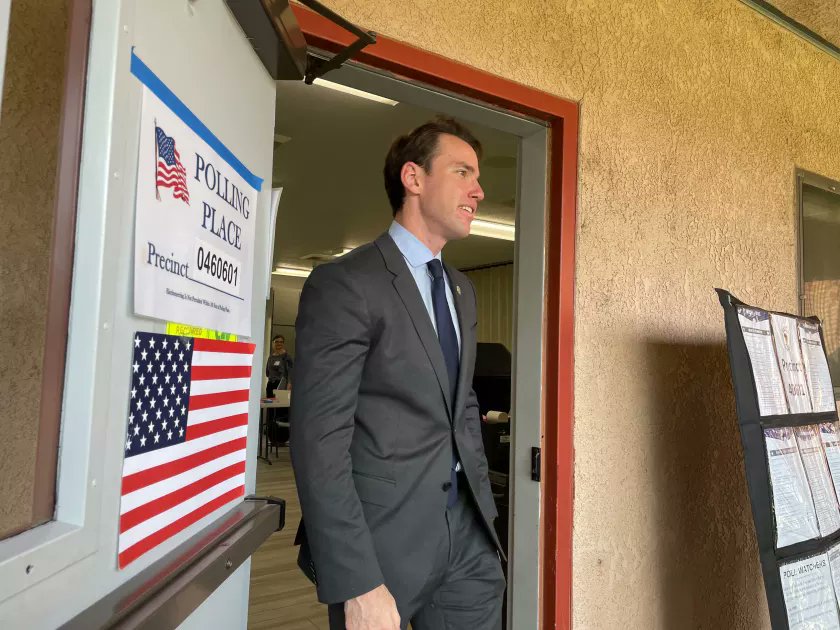
Today is #CaliforniaRecall election day.
Voters will decide whether Gov. Gavin Newsom will stay in office.
Get live updates throughout the day at latimes.com/politics/liveb…
Voters will decide whether Gov. Gavin Newsom will stay in office.
Get live updates throughout the day at latimes.com/politics/liveb…
There are just two questions on the ballot:
Should Newsom be recalled from office?
And, if he is recalled, who among the 46 candidates on the ballot should take his place?
See our voter’s guide and other voting resources at latimes.com/politics/liveb…
Should Newsom be recalled from office?
And, if he is recalled, who among the 46 candidates on the ballot should take his place?
See our voter’s guide and other voting resources at latimes.com/politics/liveb…

Meet the 46 recall candidates challenging Gov. Gavin Newsom.
They represent a mix of ideologies and political ties: Mostly Republicans, but a few Democrats, those who indicate no party preference and some affiliated with lesser-known parties.
latimes.com/politics/liveb…
They represent a mix of ideologies and political ties: Mostly Republicans, but a few Democrats, those who indicate no party preference and some affiliated with lesser-known parties.
latimes.com/politics/liveb…
The Times asked six leading replacement candidates — five Republicans and one Democrat — how they would address several pressing issues facing the state.
See their responses at latimes.com/politics/liveb…
See their responses at latimes.com/politics/liveb…
If you have mailed in or dropped off your ballot but are worried that it has somehow gotten off-track, there’s an easy way to check its status.
Read more about the ballot tracking tool at latimes.com/politics/liveb…
Read more about the ballot tracking tool at latimes.com/politics/liveb…
As election day dawns, the recall vote highlights a state “impatient with patience”
“The idea of sticking to an unsatisfactory status quo doesn’t stick,” said historian H.W. Brands with the University of Texas at Austin.
Read more at latimes.com/politics/liveb…
“The idea of sticking to an unsatisfactory status quo doesn’t stick,” said historian H.W. Brands with the University of Texas at Austin.
Read more at latimes.com/politics/liveb…
Polls are now open for the #CaliforniaRecall election.
This is the last day to vote in person or send in your ballot.
Find out where to vote and what’s on the ballot in our voter’s guide at latimes.com/politics/story…
This is the last day to vote in person or send in your ballot.
Find out where to vote and what’s on the ballot in our voter’s guide at latimes.com/politics/story…

A steady trickle of voters arrived at Pasadena City College to vote in person or drop off ballots.
For Pasadena resident Mary Forrest, her vote to oust Newsom was a matter of “patriotic duty.”
Read more live coverage of the #CaliforniaRecallElection: latimes.com/politics/liveb…

For Pasadena resident Mary Forrest, her vote to oust Newsom was a matter of “patriotic duty.”
Read more live coverage of the #CaliforniaRecallElection: latimes.com/politics/liveb…


As Santana Salas cast her ballot against recalling Gov. Newsom Tuesday morning in Santa Ana, she thought about her unvaccinated 10-year-old sister Alina.
"I’m thinking about her safety, the safety of kids who aren’t eligible for vaccination," Salas said.
latimes.com/politics/liveb…
"I’m thinking about her safety, the safety of kids who aren’t eligible for vaccination," Salas said.
latimes.com/politics/liveb…

Sister and brother Nnedinma and Obinna Ofoha arrived early to the polls at Crenshaw High School. They were both uninspired but felt obligated to vote.
“The recall doesn’t make sense, but I don’t take any election lightly,” Nnedinma said.
latimes.com/politics/liveb…
“The recall doesn’t make sense, but I don’t take any election lightly,” Nnedinma said.
latimes.com/politics/liveb…
There was no wait for the steady stream of voters who filed into the Robinson Park Recreation Center.
Wanda James voted to keep Gov. Newsom in office — equating the alternative to an unwanted intrusion of "Trumpism in disguise."
latimes.com/politics/liveb…

Wanda James voted to keep Gov. Newsom in office — equating the alternative to an unwanted intrusion of "Trumpism in disguise."
latimes.com/politics/liveb…


Recall candidate and state Assemblyman Kevin Kiley voted Tuesday, with a dozen supporters and campaign staff on hand as he brought his ballot into a mostly empty polling site at St. Mary Coptic Orthodox Church in Roseville.
Follow all our live updates: latimes.com/politics/liveb…
Follow all our live updates: latimes.com/politics/liveb…

A line of 15 people snaked out of Beverly Hills City Hall Tuesday morning as voters cast their ballots in the #CaliforniaRecall election.
The seat of local government had a special guest voting there today: recall candidate Caitlyn Jenner. latimes.com/politics/liveb…
The seat of local government had a special guest voting there today: recall candidate Caitlyn Jenner. latimes.com/politics/liveb…
In Santa Ana, Louie Boucher and his mother Eliza Boucher were weary of the pandemic. But the mother and son don’t agree on whether recalling Gov. Newsom is the answer.
Eliza cast a "yes" vote to recall Newsom, while Louie voted "no." latimes.com/politics/liveb…
Eliza cast a "yes" vote to recall Newsom, while Louie voted "no." latimes.com/politics/liveb…

Republican gubernatorial candidate John Cox made a campaign stop in Long Beach “to make it clear that this race isn’t just about the national political scene ... this is about the quality of life for Californians.”
Follow along for live updates⬇️
latimes.com/politics/liveb…
Follow along for live updates⬇️
latimes.com/politics/liveb…

At the Riverside County Registrar of Voters, Javier Cisneros said he voted in favor of recalling Gov. Gavin Newsom mostly over issues of homelessness and mandates that he felt were overreaching and hypocritical. latimes.com/politics/liveb…
On Tuesday afternoon, more than 50 people waited in line to vote outside of Fiesta Hall in West Hollywood.
Greg Sannes, who has lived in West Hollywood 23 years, was happy to wait the 35 minutes it took to vote. He said this recall election was “BS.”
latimes.com/politics/liveb…
Greg Sannes, who has lived in West Hollywood 23 years, was happy to wait the 35 minutes it took to vote. He said this recall election was “BS.”
latimes.com/politics/liveb…

Latinos, who make up 39% of the electorate, represented well at the L.A. County Registrar's Office in Norwalk and displayed again they are no monolith in terms of politics. latimes.com/politics/liveb… 

Outside the William S. Hart Museum in Newhall, voters were hesitant to talk to media about their thoughts on the recall election.
Connor O’Sullivan said he was happy about the recall election. The Massachusetts native voted for Larry Elder. latimes.com/politics/liveb…
Connor O’Sullivan said he was happy about the recall election. The Massachusetts native voted for Larry Elder. latimes.com/politics/liveb…

In San Bernardino, Terry Lee had one reason to vote against the recall today.
"To stop all this ridiculousness that’s happening," he said. "This is all political, that’s all it is." latimes.com/politics/liveb…
"To stop all this ridiculousness that’s happening," he said. "This is all political, that’s all it is." latimes.com/politics/liveb…

Gov. Newsom gave an 11th hour stump speech to rally supporters at a San Francisco union hall on Tuesday, encouraging them to get people to the polls to vote “no” on the effort to recall him.
Follow our live updates of the #CaliforniaRecallElection: latimes.com/politics/liveb…
Follow our live updates of the #CaliforniaRecallElection: latimes.com/politics/liveb…

The mask mandates imposed by Gov. Newsom motivated Melissa Gomez to vote “yes” on the #CaliforniaRecall at the Jerome Center in Santa Ana.
latimes.com/politics/liveb…
latimes.com/politics/liveb…
Times photographers have been documenting #ElectionDay in Los Angeles and Orange counties.
From a baby in Westwood to ballot counting in Santa Ana, see the photos here. latimes.com/california/sto…
From a baby in Westwood to ballot counting in Santa Ana, see the photos here. latimes.com/california/sto…

Despite the historical moment in California history, the Capitol was nearly empty Tuesday and the urgency of the recall seemed far away, except for a news crews staking out spots for live shots.
“Today is the recall?” Sacramento native Rick Avery asked. latimes.com/politics/liveb…
“Today is the recall?” Sacramento native Rick Avery asked. latimes.com/politics/liveb…

Data reported through late Tuesday shows the 64% of all ballots collected were cast by Californians age 50 or older — even though voters in those older age groups only 49% of registered voters.
Follow along for more live coverage of the #CaliforniaRecall latimes.com/politics/liveb…
Follow along for more live coverage of the #CaliforniaRecall latimes.com/politics/liveb…
• • •
Missing some Tweet in this thread? You can try to
force a refresh








